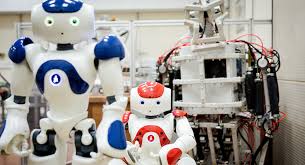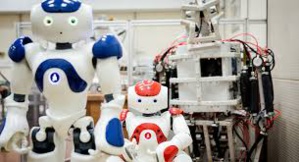Japanese automakers are turning their attention to robots to help keep the country's rapidly graying society on the move and are hence looking beyond the industry trend to develop self-driving cars.
In a country whose population is ageing faster than the rest of the world as the birthrate decreases, it saw the possibility of becoming a mass producer of robots to help the elderly, Toyota Motor Corp said.
Its automakers are put in a unique situation because of the country's changing demographics. Japan also faces dwindling domestic demand for cars in addition to issues usually associated with falling populations such as labor shortages and pension squeezes.
By launching a rental service for its walk assist system, which helps patients to learn how to walk again after suffering strokes and other conditions, Toyota, the world's second largest automaker, made its first foray into commercializing rehabilitation robots on Wednesday.
"If there's a way that we can enable more elderly people to stay mobile after they can no longer drive, we have to look beyond just cars and evolve into a maker of robots," Toshiyuki Isobe, chief officer of Toyota's Frontier Research Center, said.
For the company which evolved from a loom maker in 1905 into an automaker whose mission is to "make practical products which serve a purpose", mass producing robots would be a natural step forward, he added.
"Be it robots or cars, if there's a need for mass produced robots, we should do it with gusto," Isobe said.
Dwarfing the global average of about 8.5 percent and with the number of people aged 65 or older accounting for 26.7 percent of the population in 2015, Japan is graying faster than the rest of the world.
A shrinking working population means that fewer able-bodied adults are available to look after them and demand for care services for elderly people has boomed as a result.
According to the International Federation of Robotics, sales of robots for elderly and handicap assistance globally are expected to increase substantially within the next 20 years, and will total about 37,500 units in 2016-2019.
As older drivers stop buying cars while car ownership becomes less of a priority among younger drivers, car sales in Japan have fallen 8.5 percent between 2013-2016 at the same time.
Committing $1 billion to a robotics and A.I. research center, Toyota is still competing fiercely to develop self-driving cars like most major automakers.
As it stretched the company further beyond its comfort zone, it took Toyota longer to develop robots than cars, Isobe conceded. As a result, it took more than 10 years to bring Toyota's new walking assist system to market.
"The biggest challenges have been in determining the needs of the robot market, which is relatively new, and to ensure that our products are safe," Isobe said.
Many companies including medical technology companies including Switzerland's Hocoma and robot manufacturers such as ReWalk Robotics of the United States, both of which have developed robotic walking assist systems, are in this industry bit but industry experts said that automakers were well placed to compete with such companies.
"Cars operate using engines and other components which enable mobility and control," said Nagayoshi Nakano, research vice president at Gartner Research's IoT Center of Excellence.
"On top of that, many of them have been partnering with the likes of Google and other companies looking at applying artificial intelligence, which will put them in a strong position to compete in robot services for the elderly."
(Source:www.reuters.com)
In a country whose population is ageing faster than the rest of the world as the birthrate decreases, it saw the possibility of becoming a mass producer of robots to help the elderly, Toyota Motor Corp said.
Its automakers are put in a unique situation because of the country's changing demographics. Japan also faces dwindling domestic demand for cars in addition to issues usually associated with falling populations such as labor shortages and pension squeezes.
By launching a rental service for its walk assist system, which helps patients to learn how to walk again after suffering strokes and other conditions, Toyota, the world's second largest automaker, made its first foray into commercializing rehabilitation robots on Wednesday.
"If there's a way that we can enable more elderly people to stay mobile after they can no longer drive, we have to look beyond just cars and evolve into a maker of robots," Toshiyuki Isobe, chief officer of Toyota's Frontier Research Center, said.
For the company which evolved from a loom maker in 1905 into an automaker whose mission is to "make practical products which serve a purpose", mass producing robots would be a natural step forward, he added.
"Be it robots or cars, if there's a need for mass produced robots, we should do it with gusto," Isobe said.
Dwarfing the global average of about 8.5 percent and with the number of people aged 65 or older accounting for 26.7 percent of the population in 2015, Japan is graying faster than the rest of the world.
A shrinking working population means that fewer able-bodied adults are available to look after them and demand for care services for elderly people has boomed as a result.
According to the International Federation of Robotics, sales of robots for elderly and handicap assistance globally are expected to increase substantially within the next 20 years, and will total about 37,500 units in 2016-2019.
As older drivers stop buying cars while car ownership becomes less of a priority among younger drivers, car sales in Japan have fallen 8.5 percent between 2013-2016 at the same time.
Committing $1 billion to a robotics and A.I. research center, Toyota is still competing fiercely to develop self-driving cars like most major automakers.
As it stretched the company further beyond its comfort zone, it took Toyota longer to develop robots than cars, Isobe conceded. As a result, it took more than 10 years to bring Toyota's new walking assist system to market.
"The biggest challenges have been in determining the needs of the robot market, which is relatively new, and to ensure that our products are safe," Isobe said.
Many companies including medical technology companies including Switzerland's Hocoma and robot manufacturers such as ReWalk Robotics of the United States, both of which have developed robotic walking assist systems, are in this industry bit but industry experts said that automakers were well placed to compete with such companies.
"Cars operate using engines and other components which enable mobility and control," said Nagayoshi Nakano, research vice president at Gartner Research's IoT Center of Excellence.
"On top of that, many of them have been partnering with the likes of Google and other companies looking at applying artificial intelligence, which will put them in a strong position to compete in robot services for the elderly."
(Source:www.reuters.com)






